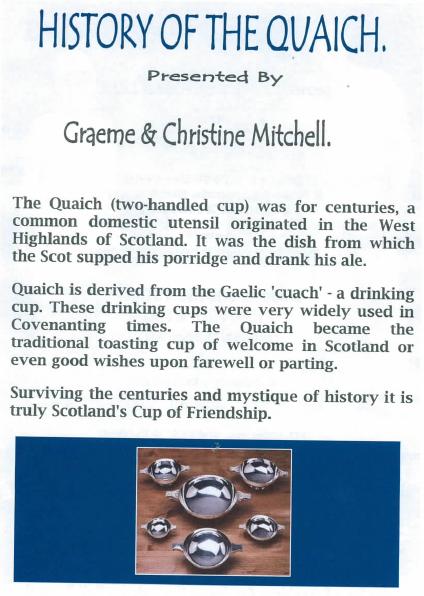As Claire is settling in to her new routine in the 18th century (as much as can be expected, anyway), she recounts some of the daily activities that are becoming common pleasantries: helping in the kitchen, visiting the stables, working in the castle garden.
I would join the gathering in the Great Hall to listen to the evening’s entertainment of stories, song, or the music of harp or pipes. I could listen to Gwyllyn the Welsh bard for hours, enthralled in spite of my total ignorance of what he was saying, most times.
Sometimes I like to just listen to international music when I just want to listen to some contemporary beats without being assaulted by lyrics. What I call "international music" is essentially any kind of world music which is either instrumental or where I don't understand the language. Since I only speak and understand English, the field is pretty wide open! Maybe Brazilian or European folk music, doesn't matter; as long as I can't understand what they're saying so I don't have to think about it, just enjoy it for what it is. That's how I picture Claire's enjoyment of the bard.
When she gets invited to go berry picking, she relates a bit of the routine:
We plucked only the best, dropping them into our baskets in juicy heaps, eating as much as we could hold, and carrying back the remainder to be made into tarts and pies.
This brought to mind a memory of me of "helping" my mother to pick strawberries when I was just a "wee bairn". I'm surprised when it came time to weigh how many pounds we had picked, that the farm hands didn't want to weigh
me on the way out of the berry patch! One in the bucket, two in my mouth, sit in the shade, eat some more, put one or two in the basket, eat another handful -- I'm pretty sure I wan't really much help at all!
Even among the preparations for the Gathering, Claire is still thinking of ways to escape. I like how there is really no plan except just to get back to the rocks at Craigh na Dun...but then what? I'm sure I would be thinking the same thing. Although I've noticed she hasn't mentioned Frank in quite a while...
After Claire befriends Geilie Duncan on the berry picking expedition, she also has an opportunity to meet with her in the nearby town of Cranesmuire to receive some herbs needed for the castle population. Geilie is depicted as a very likeable character, although each time she is described, she is related as having a sharp wit and "a wry-tongued, cynical viewpoint". I had to stifle a laugh, as I couldn't help but think of my oldest daughter; it was practically describing her to a "T", and then I just kept picturing her in the action in the place of Geilie. Can't imagine where she gets that wry wit and cynicism...
While Claire is at the Duncan's home, a commotion begins outside near the town square:
For some time, I had been conscious of noises coming from the street outside, but had attributed them to the traffic of villagers coming from Sunday Mass; the kirk was located at the end of the street by the well, and the High Street ran from kirk to square, spreading from there into a fan of tiny lanes and walks.
The fact that the population is Catholic shows how far removed the village is within the Highlands. Since Catholicism had essentially been outlawed in Scotland after the Reformation, it was only in the remote areas of the Highlands where Catholicism was still practiced, though usually not openly.
Recusants as they were called, would be persecuted for not attending Anglican services, and even included some Reformed Protestant Christians (or any dissenters from the Church of England). So to have an open mob of villagers coming from Mass, it would definitely be a localized enclave. Of course, with my very limited understanding of the Jacobite rising, this seems to fit neatly with the socio-politics of the day.
I'm also quite amazed at how deftly the time-oriented perspective is maintained. When Claire equivocates the mob in Cranesmuire to the similar dissociation of the German people in Nazi Germany, she writes:
Looking down on the assembly, standing patiently in the drizzle awaiting a verdict, I suddenly had a vivid understanding of something. Like so many, I had heard, appalled, the reports that trickled out of postwar Germany; the stories of deportations and mass murder, of concentration camps and burnings. And like so many others had done, and would do, for years to come, I had asked myself, “How could the people have let it happen?"
I know at the outset of this blog I stated I was not going to comment on Diana's writing, but I was struck with a thought when I read this passage. As Diana is relating this story, she has to be extremely mindful of writing not from our current perspective, but from Claire's WWII perspective. I noticed in the foregoing passage how she emphasized, "like so many others had done,
and would do, for years to come..." Claire could not have known that except in understanding the depth of the German indifference would have historical ramifications, which of course it did. I don't know, a minor point perhaps, but it did make me think how many phrases and references we take for granted that cannot be used by the author because they would not have been in existence in Claire's time in the 1940's. Challenging, indeed.
The tension of the mob scene continues:
...I thought of myself stepping out, alone and powerless, to confront that mob of solid and virtuous citizens, avid for the excitement of punishment and blood to alleviate the tedium of existence.
Some things never change. Similar things excite today: the daredevil stunts, the Indy car crashes, the boxing injuries; people still clamor for these things to "alleviate the tedium of existence".
To me, the most poignant statement comes as Claire struggles with her own inability for action to somehow help this poor tanner's boy:
To stand against a crowd would take something more than ordinary courage; something that went beyond human instinct. And I feared I did not have it, and fearing, was ashamed.
Wow. Just...wow. A courage that goes beyond human instinct; that, to me, is unbelievably profound. Claire's recognition of her lack of this type of courage goes beyond her own shame to us; to me. Can we not identify with some illustration from our own life when we refused to be the one who "stood in the gap" for another? And then felt ashamed for not having done what was right? Wow.
The scene with the tanner's boy at the pillory is central to Claire's adventure in the village that day, and as such we see many insights into the justice of the day: its barbarity and striking cruelty, but also its effectiveness as the young tanner lad, ear pinned to the pillory, was reproved for stealing by the citizens of the community:
...now and then a more sober citizen was to be seen, seizing a moment from the round of daily duties to attend to the moral improvement of the delinquent by means of a few well-chosen words of reproval and advice.
I'm pretty sure I'm not the only one who can think of a few young people who would have benefited greatly from a similar public display and embarrassment. If only our community provided opportunities for more elder involvement with our young people, our streets might become safer environments for all.
While the ear-nailing was extreme, it makes for a great dramatic scene with Jamie and Claire, as Claire convinces Jamie to help her release the lad so he does not have to rip his head free of the nail. I thoroughly enjoyed Claire's mock faint in the orchestration of the distraction so Jamie could pull the nail and help the young lad. Perhaps we meet up with the lad later in the story...?
At first, my initial thought was, again, why would Jamie, who is already shown to be in hiding of sorts, risk exposing himself over such a comparative trivial manner? But then, in the closing narration, the question is answered for me, almost word-for-word as the question had formed in my head:
“But it was a risk to you,” I said, persisting. “I didn’t realize you’d be in danger when I asked you.”
"Ah,” he said, noncommittally. And a moment later, with a hint of amusement, “Ye wouldna expect me to be less bold than a wee Sassenach lassie, now would ye?”
I can hear the collective swooning from here. But it does indeed fit the moment, and of course, Jamie's character nicely.
All in all, this chapter is a clever and briskly moving narrative of village life in those times.



